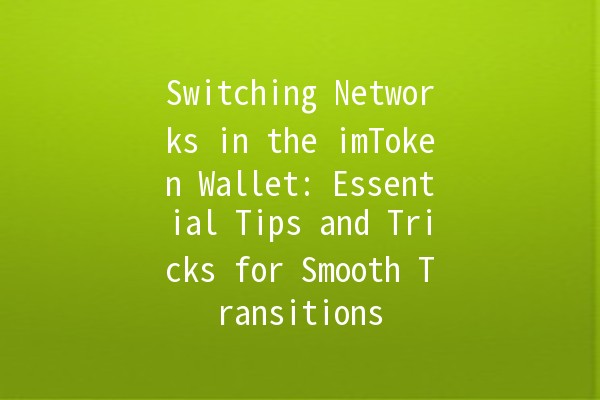The world of cryptocurrencies is constantly evolving, presenting both opportunities and challenges for users. One of the essential tools for managing your digital assets is a cryptocurrency wallet. ImToken is one of the most popular wallets available today, offering a userfriendly interface and a plethora of features that cater to both beginners and seasoned traders alike. An important aspect of using imToken effectively is knowing how to switch networks smoothly. In this article, we will discuss practical tips and tricks that will enhance your experience when switching networks in the imToken wallet.
In the cryptocurrency realm, different networks cater to different tokens and protocols. For example, Ethereum (ETH) is distinct from Binance Smart Chain (BSC), and tokens on these networks cannot be transferred across different blockchains. Being able to switch networks seamlessly is crucial for transactions, trading, and interacting with decentralized applications (dApps). Not only does it allow users to manage diverse assets effectively, but it also opens the door to exploring various investment opportunities.
The imToken wallet supports multiple networks, including Ethereum, Binance Smart Chain, and more. It's vital to familiarize yourself with these networks and the tokens associated with each one.
Understanding Tokens: If you own a token on Ethereum like LINK (Chainlink), you must switch to the Ethereum network to perform transactions related to that asset. Conversely, if you want to use PancakeSwap on Binance Smart Chain, make sure you switch to the BSC network.
By being aware of the networks and their associated tokens, you'll be equipped to make informed decisions and avoid potential loss of assets.

The imToken wallet offers several features that facilitate network switching. Understanding and using these features will make the process smoother and more efficient.
Network Selection: Within the imToken application, access the settings to view the list of supported networks. Utilize the “Switch Network” option to select your desired network easily.
Token Management: Ensure that your assets are categorized correctly under their respective networks. Keeping a wellorganized portfolio aids in reducing confusion when interacting with multiple networks.
Utilizing these builtin features can drastically reduce the time it takes to switch networks, letting you focus on your investment strategies instead of wrestling with technicalities.
Different networks have varying fees and speeds. Being aware of these can save you money and time when making transactions.
Ethereum Fees: Generally, Ethereum transactions can incur high gas fees, especially during peak times. If you are switching to the Ethereum network for a transaction, check realtime gas prices using tools like ETH Gas Station to determine if it's a good time to trade.
BSC Fees: On the other hand, Binance Smart Chain usually has lower fees. If your transaction is not urgent and you're looking to save on costs, consider using the BSC network for transactions involving tokens supported on that network.
This knowledge allows you to pick the best time and network for your transactions, maximizing your profitability.
Decentralized applications (dApps) have made managing digital assets easier. Using dApps within imToken can provide added functionalities, especially when switching networks.
DeFi Platforms: Accessing DeFi platforms can often require you to switch networks to interact with certain pools or yield farms. Most dApps will guide you through the network switch process.
Token Swapping: Platforms like Uniswap or PancakeSwap allow you to swap tokens seamlessly within the wallet after correct network switching.
By leveraging these dApps, you will not only simplify your asset management but also enhance your overall trading experience.
The cryptocurrency landscape is dynamic, with networks continuously evolving. New updates can affect network fees, transaction speeds, and availability of certain tokens.
Community and Forums: Engage with crypto communities on platforms like Reddit or Twitter to keep abreast of updates.
Compiling Resources: Create a personal list of reliable resources, including official channels of imToken and other networks, to ensure you're always informed.
By staying informed, you can prepare for any possible changes in the networks you frequently use, helping you avoid sudden inconveniences.
To switch networks in imToken, open the app, click on the ‘Wallet’ tab, select the token you want to manage, and then choose the network you wish to switch to based on your asset needs. Make sure the tokens you want to interact with are supported on that network.
Switching networks in imToken does not incur fees; however, executing trades or transactions on different networks may involve network gas fees, which vary depending on the network.
If you send tokens to the wrong network, they may become unrecoverable. Always doublecheck the network selected before confirming transactions to ensure asset security.
Currently, imToken is primarily a mobile wallet app. However, it is critical to follow official updates regarding the possible development of web interfaces or browser extension options in the future.
Yes. As long as you have your recovery phrase written down securely, you can restore your wallet on any device by installing the imToken app and using the recovery option.
Swaps can take longer due to network congestion. For Ethereum, high gas prices can also slow down transactions. It is advisable to monitor gas prices and perform swaps when congestion is low.
By implementing these tips while navigating the imToken wallet, users can efficiently manage their assets and take full advantage of the features offered across different networks. With continuous education and awareness, switching networks will become a seamless process, bolstering overall investment strategies and user engagement with the cryptocurrency ecosystem.